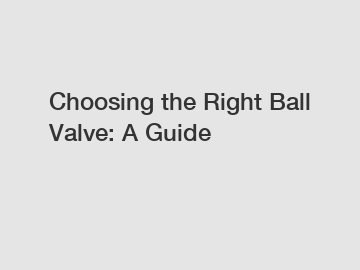Choosing the Right Ball Valve: A Guide
Google Hot Topics: Choosing the Right Ball Valve: A Guide?
Are you considering investing in a ball valve but are unsure about which one to choose? With countless options available in the market, finding the right ball valve can be a daunting task. In this comprehensive guide, we will discuss the factors you need to consider when choosing a ball valve, ensuring that you make an informed decision for your specific needs.
1. Understand your application:

Before diving into the world of ball valves, it's crucial to understand the application for which you need the valve. Is it for a residential plumbing system, an industrial process, or a commercial project? Each application may have different requirements and specifications, necessitating various types of ball valves. Identifying your application is the first step toward selecting the most suitable ball valve.
2. Material selection:
Ball valves are available in a variety of materials such as stainless steel, brass, PVC, and bronze. The material chosen for the valve depends on the media being transported through it. For example, if you are dealing with corrosive fluids, a stainless steel ball valve would be a wise choice due to its excellent corrosion resistance. Similarly, brass and bronze ball valves are widely used in plumbing applications due to their durability and resistance to rust. Consider the compatibility of the material with the media to ensure a long-lasting and efficient ball valve.
3. Valve size and pressure rating:
Choosing the right size and pressure rating is vital for the optimal functioning of a ball valve. The size of the valve should align with the pipe size to ensure smooth flow and prevent excessive pressure drop. Additionally, it is important to consider the maximum pressure and temperature that the valve will be subjected to. Every ball valve comes with a pressure rating, which indicates the maximum pressure it can handle. Failing to account for these factors may lead to valve failure or inadequate performance.
4. Valve operation:
Another critical factor to consider is the method of valve operation. Ball valves can be operated manually or automatically. Manual ball valves require human intervention to open or close, whereas automatic valves can be controlled remotely using pneumatic, electric, or hydraulic actuators. The choice between manual and automatic operation depends on factors such as accessibility, convenience, and the need for real-time control. Make sure to evaluate the operational requirements before finalizing the type of ball valve.
5. Flow characteristics:
Understanding the flow characteristics of your system is essential for selecting the right ball valve. Different ball valve designs, such as full bore or reduced bore, impact the flow of the media. Full bore valves offer unobstructed flow, allowing maximum throughput with minimal pressure drop. On the other hand, reduced bore valves have a smaller ball size, resulting in a slight reduction in flow and increased pressure drop. Consider the flow requirements of your application to determine the most suitable design.
6. Leakage prevention:
When it comes to ball valves, leakage prevention is of utmost importance. Valves with superior sealing capabilities minimize the risk of leaks, which can lead to hazardous situations, increased maintenance, and unnecessary costs. Look for ball valves that feature quality seals, such as PTFE or graphite, to ensure tight shut-off and dependable performance. Additionally, considering factors like system pressure and the type of media can help determine the level of required sealing.
In conclusion, choosing the right ball valve involves a thorough understanding of your application, material selection, proper sizing, valve operation, flow characteristics, and leakage prevention. By considering these points and matching them with your specific requirements, you can select a ball valve that offers optimal performance, efficiency, and longevity. Investing time and effort in the selection process will undoubtedly pay off in the form of a reliable and functional ball valve solution. So, don't rush your decision, follow this guide, and confidently choose the right ball valve for your needs.
For more information, please visit slab gate valve supplier, China slab gate valve manufacturer, slab gate valve factories.
143
0
0


Comments
All Comments (0)